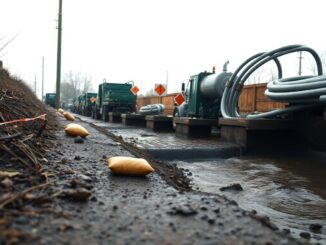What happens when well-intentioned recycling initiatives clash with local wildlife? A deep dive into the chaos caused by eco-friendly food bins in the New Forest reveals crucial lessons for future sustainability efforts.

Topics covered
When local councils roll out new recycling initiatives, they’re often driven by a noble aim: reducing waste and promoting sustainability. But have you ever wondered whether these efforts truly deliver on their promise? The recent introduction of eco-friendly food bins in the New Forest has led to unexpected chaos, raising an important question: are these initiatives really beneficial, or do they create more problems than they solve? The situation in Hampshire is a prime example of the challenges that arise when implementing such programs in rural areas where wildlife plays a crucial role.
The unintended consequences of eco-friendly initiatives
In recent weeks, the New Forest area has introduced plastic caddies specifically designed for food waste recycling. While the intention is to encourage responsible disposal and cut down on landfill usage, the reality has been anything but smooth.
Locals are understandably alarmed as wild donkeys—those charming creatures that roam freely in the region—have taken a liking to these bins, feasting on leftover scraps. This situation highlights a critical principle: any product or initiative must consider its environment, especially when wildlife is involved.
According to local reports, around 200 free-roaming donkeys inhabit the New Forest. These animals are not just a quaint rural feature; they play a vital role in maintaining the local ecosystem. However, their newfound interest in the food waste bins raises serious health concerns. Farmers and residents worry that the donkeys could contract illnesses like foot and mouth disease from the waste, which could have severe economic implications for local agriculture. This situation underscores the need for a thoughtful, informed approach to sustainability initiatives.
The introduction of these bins has led to immediate complications. Photos from Brockenhurst, a village within the national park, capture donkeys rummaging through toppled bins, creating a mess and potentially spreading diseases. Residents have voiced their frustrations, noting that while the initiative was well-intentioned, it has spiraled into chaos. There are urgent calls for action to protect both the wildlife and the health of the community.
Lessons from the New Forest case study
The New Forest’s food waste bin initiative offers valuable lessons for founders and product managers considering similar sustainability projects. First and foremost, understanding the local context is crucial. Launching a product without fully grasping its implications can lead to unforeseen consequences, as we’ve seen with the wild donkeys. Achieving a successful product-market fit requires a deep dive into the target environment and the stakeholders involved.
Secondly, proactive communication with the community is essential. Residents have expressed frustration over the lack of clear guidance on how to manage the new bins. Providing straightforward protocols—like how to store bins securely and what types of waste can go inside—is vital. Without this information, chaos can ensue, undermining the initiative’s original goals.
Lastly, flexibility and adaptability are key when responding to real-world feedback. The challenges faced in the New Forest illustrate the need for iterative improvements in product design and deployment. For instance, reinforcing bin locks to keep wildlife out could be an immediate solution. Collaborating with local agricultural organizations may also yield tailored strategies that address both ecological and community needs.
Actionable takeaways for future sustainability projects
Reflecting on the New Forest’s experience with eco-friendly food bins, several actionable takeaways emerge for future initiatives. First, conduct thorough environmental assessments before launching new products or services. Engaging with local stakeholders helps to identify their concerns and needs, fostering a sense of community ownership that can enhance the initiative’s success.
Second, consider implementing pilot programs in controlled environments to gauge reactions and adjust as necessary. This approach allows for testing assumptions before a wider rollout, reducing the risk of chaos. Collecting data during these pilot phases can provide insights into the initiative’s impact on both the community and local wildlife.
Lastly, embrace a mindset of continuous improvement. Sustainability efforts must adapt based on real-world experiences and feedback. Be ready to iterate on designs and processes to ensure that the goals of waste reduction and ecological health are met without creating unintended consequences.




